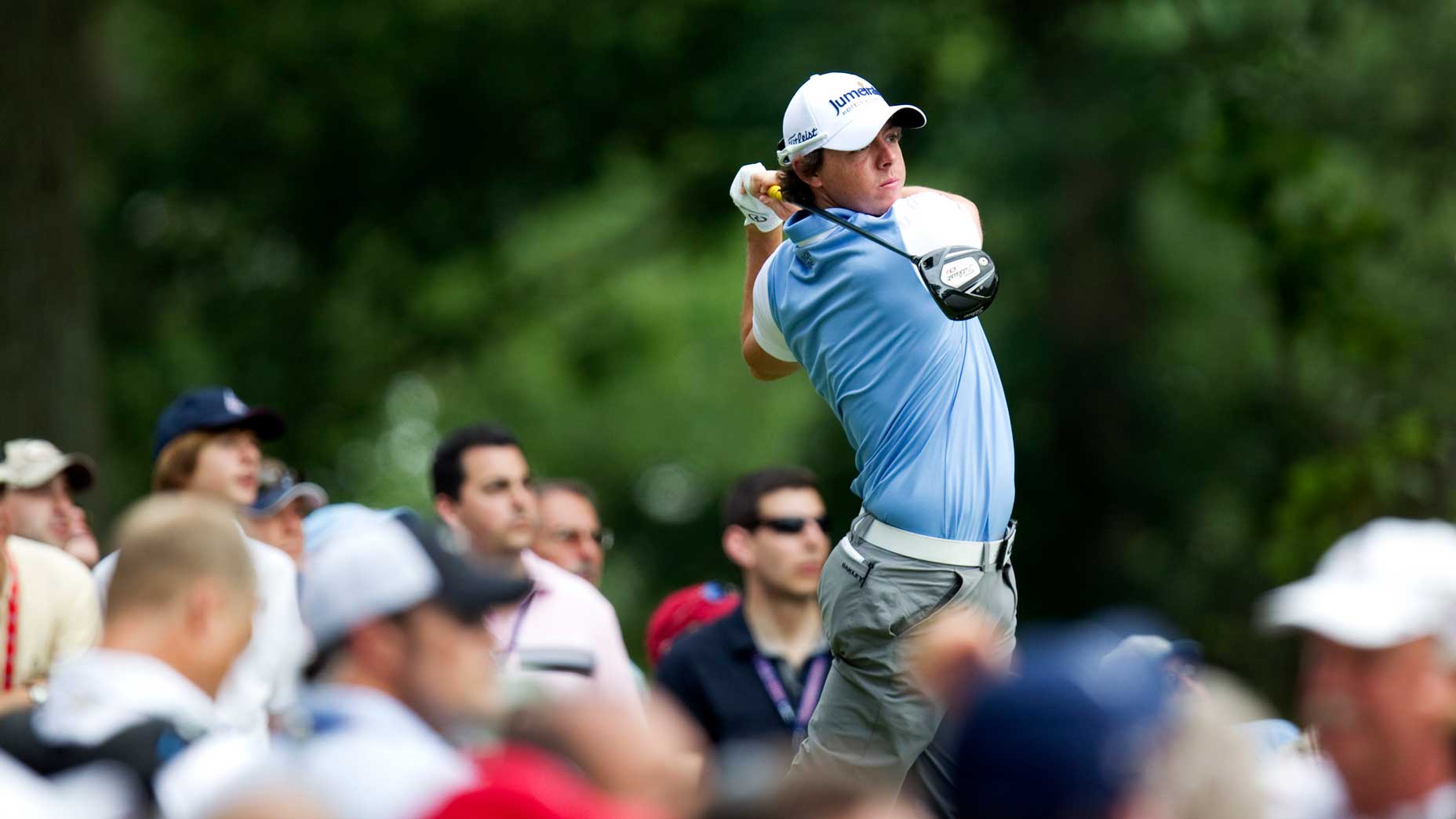
Rory McIlroy at the 2011 U.S. Open
Getty Images
When Padraig Harrington first met Dustin Johnson, he admitted he didn’t actually know anything about him, no less his now-prodigious length.
As Harrington, who recently joined the No Laying Up podcast to cover a number of topics from last week’s U.S. Open, to the golf ball rollback debate, to PGA Tour-LIV and more, explained, it was the 2008 Players Championship. That was Johnson’s rookie year and he got into the field as an alternate.
“We didn’t know who the lad was,” Harrington said on the podcast. “Funny story. ‘Who’s this guy?’ ‘No idea.’ We’re looking at him on the first tee and he takes an iron out at the 1st at Sawgrass.
“A bit nervous this lad. We’re kinda having a little chuckle to ourselves.”
Clearly, Harrington could see Johnson as a strapping 6-foot-4 22-year-old at the time, but with just two PGA Tour top-10s at the time, Harrington, the reining Open Championship winner, looked right past him.
Or at least until he struck his opening tee shot.
“Obviously this iron came off like a different quality, a different strike, the power,” he said. “We said, ‘OK maybe he wasn’t that nervous.’”
According to Shot Link, Johnson’s tee shot went 285 yards with an iron. It was an incredible sight in a day when hitting irons and even fairway woods that far was almost unthinkable.
But it’s also something Harrington said he almost never sees off the first hole at TPC Sawgrass anymore, but not because it can’t happen.
“The reality of it is he’d never hit iron off that tee now,” he said. “He’d take his driver and hit it.”
Johnson missed the cut that week, shooting 73-80 in his first taste of the PGA Tour’s flagship event. But he got his first win at the Turning Stone Resort Championship that fall, on his way to a career that has so far amassed more than $75 million in PGA TOUR earnings. It was a time when many great athletes like Johnson, were choosing to play golf earlier and focusing more on chasing speed and huge driving distance numbers.
Harrington said he saw this coming not long after he came out on the DP World Tour in the late 90s and early 2000s.
But even as players got longer and longer, it wasn’t until 2010 when players really started to take advantage and try to overpower golf courses. Rory McIlroy led the way, Harrington said.
“I think Rory changed the game,” he said. “Rory came out [on the PGA Tour] in 2010 and he’s the first long hitter who plays like a long hitter. The rest were all bullied into playing like short hitters. It was amazing. All the long hitters up to 2011, they’d hit irons off the tees on par 4s. They’d hit it in the same place the short hitters would hit it.”
McIlroy didn’t leave his driver in the bag and was rewarded for it. He averaged 293.3 yards for all drives in 2010, which was good for ninth on Tour, and was sixth in strokes gained: off-the-tee. Two years later, he upped those numbers, finishing second in SG: off-the-tee averaging 298.6 yards on all drives.
Johnson saw a similar uptick in his distance on all drives, going from 296.8 his rookie year in 2008 up to 301.8 in 2012 and ranked second in SG: off-the-tee despite hitting just 56 percent of his fairways. He was just 25th in the stat his rookie year.
“They saw Rory doing it and they said, ‘Oh, so we could do this as well?’ Harrington said. “And they started hitting drivers. And you will see that their best performance coincided with after Rory came out.”
Johnson won twice in his first two years on Tour, but he really became the Dustin Johnson we know today when he won twice in 2010, McIlroy’s first season as a PGA TOUR member. He’s won 20 more times in the 12 seasons since.
Back then, golf was still considered a finesse and a strategy game. But now most of the game’s most analytical thinkers believe hitting the ball as far as possible is the best way to play. This is why Harrington said he’s continued to chase more distance well into his 50s.
“All the long hitters, they play to their strengths,” he said. “They hit driver and they take their chances. And that’s why, up to that point, it wasn’t important to be a long hitter, because at the end of the day, none of them were any good in terms of their play. Once Rory came along, all of a sudden you had to be in that number because the likelihood is one of the winners is going to come from that group [of long hitters].
“Back in the day, you were trying to beat one long hitter. Now you’re trying to beat 50.”










